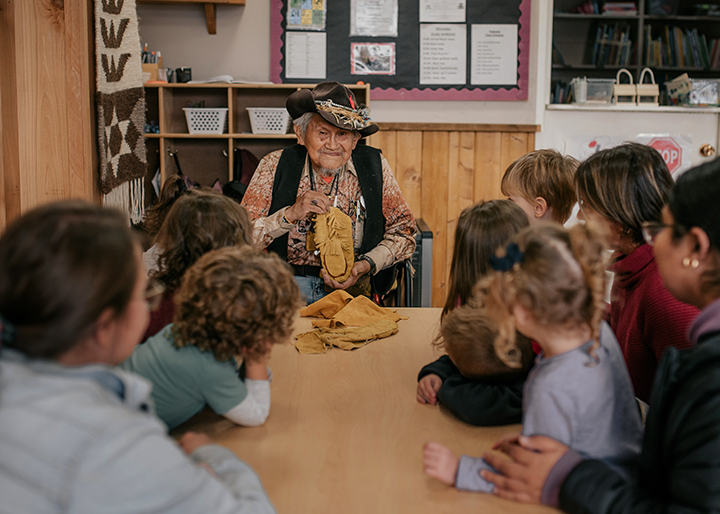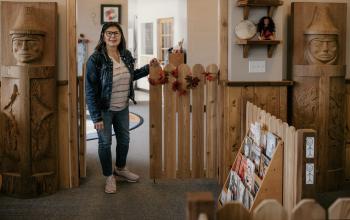Image Caption
Summary
Local Journalism Initiative Reporter
Windspeaker.com
Futures 4 Nations pre-school in Sto:lo territory is an Aboriginal Head Start Association of B.C. (AHSABC) site in Mission, B.C.
For 25 years, staff have created a beautiful space for children to spend joyful days in. It’s a space the community has other more difficult memories of.
The building is a former residential school. Once called St Mary's, it has now returned to an older name, Pekw'xe:yles (broken bluff).
Entering the space, children and families are met with the sounds of laughing and playing. This is followed by the aroma of food cooking in the next room. There’s an undercurrent, a gentle rise and fall of considerate adult conversations happening, with Elders’ voices woven amongst them.
“It's the people there who warm it, the laughter that you hear,” said Joan Gignac, director of AHSABC. “It feels good. And Zelda Williams protects it in a way that acknowledges yes, it has this history, but we made it beautiful for the kids.” Quality, loving and reflective programs can be anywhere, Gignac explained.
“They've made a place where families show up every day with their kids. They know the history and they choose to be there, because they know Auntie Zelda's there. They know that it feels good,” Gignac said.
AHSABC is implementing Bill C-15, The Early Learning and Child Care Act, and the Early Childhood Educators Act, providing services and programs that have real impact for communities, with no fees to families. There are 12 AHS pre-schools and 25 AHS childcare centres in B.C., serving off-reserve and urban communities. AHSABC’s mandate is to help urban Indigenous communities manage their own early years sites, strengthening Indigenous identity and connection, Gignac said.
Sites usually begin with a grandparent, or an aunty or uncle, “who have experienced Head Start programming, and want to bring it to their community to fill a need for childcare,” said Gignac.
At Futures 4 Nations, Mamele'awt Qweesome Housing was the host organization that reached out to AHSABC.
“It doesn’t come from the government deciding for a community. It comes from communities themselves wanting to create a program that reflects who they are.” The goal is to create services and programs that can be “the new village for urban Indigenous families.”
Gignac believes a beautiful childcare space doesn’t have to be a “big, beautiful, brand new shiny building that looks like a catalogue for childcare. If that can be a starting place for some, that’s great, but warm it up. Warm it up with the people and the culture of the people.”
That's what Ay'wha:tia Zelda Williams (Stsa'iles, Musqeaum), the Early Childhood Education manager, and her team do, using culturally meaningful art and song to fill the space.
Williams became a pre-school teacher “to know that my Indigenous people were going to be safe as they were educated. I knew in my heart that I could keep them safe and be a better educator than what I recall growing up with day schools in the late sixties.”
For Williams, the key to creating a warm, welcoming, and friendly centre is connection. "When we connect with our families, we usually do home visits so we can really connect with them and relate to them,” she said.
Two welcome poles beautify the entry. The children helped carve them with Ray Silver Jr. and his son Ray. They share a traditional name, Xaytelq, and are from Sumas First Nation.
“Protecting our families, protecting our space,” was the intention behind making those poles, said Williams. “It's just changing the whole outlook of that space and the history that it has, making it our own, taking back. And it took us 25 years to get where we're at now.”
Language is brought into the program through songs. Most of Futures 4 Nations staff are Sto:lo, “so it just comes easy and it comes natural. It's just who we are and where we come from.”

The songs are “a part of our healing, and a way for us to pray for our people,” said Williams. One of the visiting Elders, Mesisl Herman Dan, has been bringing song and prayer to the program for the full 25 years it’s been running.
“The strength and guidance and support from my ancestors, culture, and my late matriarchs, is what made the empowered Indigenous woman that I am today,” Williams said. “Without that, I wouldn't be able to be in the position that I am, to guide and support my families throughout the time that they spend with us.”
“It takes a lot for a parent to be able to give up her child for their first year of education, so it's our honor.”
AHSABC sites will host an open house on Saturday, Dec. 3. Here’s a list of those taking part:
- Clever Raven (Courtenay)
- Treasure our Youngs Ones (Port Alberni)
- Thi Lelum Smuneem (Nanaimo)
- Uxwin Mimne (Nanaimo)
- Island Metis (Victoria)
- XaXe STELITKEL (Victoria)
- Awahsuk (Surrey)
- Kermode Daycare (Terrace)
- Kermode Preschool (Terrace)
- Tansi Head Start (Chetwynd)
- Eagles Nest (Clearwater)
- Little moccasins (Williams Lake)
- Little Mukluks (Williams Lake)
- Keda Yaze Kime (Dease Lake)
- Prince George AHS
- The Power of Friendship (Prince George
- 17th Avenue Childcare (Prince George)
- Skeh Baiyoh (Prince George)
- Qwallayuw (December 15th)
- Talking Little Feet (Grand Forks)
- Conayt Aboriginal Head Start (Merritt)
- Na'tsa'maht AHS CC (Surrey)
Local Journalism Initiative Reporters are supported by a financial contribution made by the Government of Canada.

